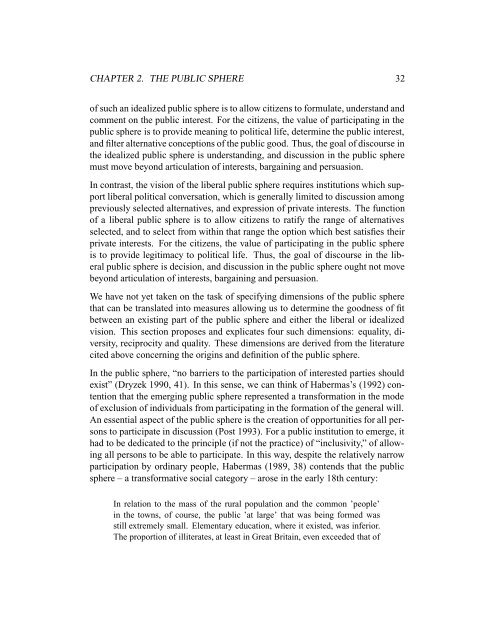Expanding the Public Sphere through Computer ... - ResearchGate
Expanding the Public Sphere through Computer ... - ResearchGate
Expanding the Public Sphere through Computer ... - ResearchGate
You also want an ePaper? Increase the reach of your titles
YUMPU automatically turns print PDFs into web optimized ePapers that Google loves.
CHAPTER 2. THE PUBLIC SPHERE 32<br />
of such an idealized public sphere is to allow citizens to formulate, understand and<br />
comment on <strong>the</strong> public interest. For <strong>the</strong> citizens, <strong>the</strong> value of participating in <strong>the</strong><br />
public sphere is to provide meaning to political life, determine <strong>the</strong> public interest,<br />
and filter alternative conceptions of <strong>the</strong> public good. Thus, <strong>the</strong> goal of discourse in<br />
<strong>the</strong> idealized public sphere is understanding, and discussion in <strong>the</strong> public sphere<br />
must move beyond articulation of interests, bargaining and persuasion.<br />
In contrast, <strong>the</strong> vision of <strong>the</strong> liberal public sphere requires institutions which support<br />
liberal political conversation, which is generally limited to discussion among<br />
previously selected alternatives, and expression of private interests. The function<br />
of a liberal public sphere is to allow citizens to ratify <strong>the</strong> range of alternatives<br />
selected, and to select from within that range <strong>the</strong> option which best satisfies <strong>the</strong>ir<br />
private interests. For <strong>the</strong> citizens, <strong>the</strong> value of participating in <strong>the</strong> public sphere<br />
is to provide legitimacy to political life. Thus, <strong>the</strong> goal of discourse in <strong>the</strong> liberal<br />
public sphere is decision, and discussion in <strong>the</strong> public sphere ought not move<br />
beyond articulation of interests, bargaining and persuasion.<br />
We have not yet taken on <strong>the</strong> task of specifying dimensions of <strong>the</strong> public sphere<br />
that can be translated into measures allowing us to determine <strong>the</strong> goodness of fit<br />
between an existing part of <strong>the</strong> public sphere and ei<strong>the</strong>r <strong>the</strong> liberal or idealized<br />
vision. This section proposes and explicates four such dimensions: equality, diversity,<br />
reciprocity and quality. These dimensions are derived from <strong>the</strong> literature<br />
cited above concerning <strong>the</strong> origins and definition of <strong>the</strong> public sphere.<br />
In <strong>the</strong> public sphere, “no barriers to <strong>the</strong> participation of interested parties should<br />
exist” (Dryzek 1990, 41). In this sense, we can think of Habermas’s (1992) contention<br />
that <strong>the</strong> emerging public sphere represented a transformation in <strong>the</strong> mode<br />
of exclusion of individuals from participating in <strong>the</strong> formation of <strong>the</strong> general will.<br />
An essential aspect of <strong>the</strong> public sphere is <strong>the</strong> creation of opportunities for all persons<br />
to participate in discussion (Post 1993). For a public institution to emerge, it<br />
had to be dedicated to <strong>the</strong> principle (if not <strong>the</strong> practice) of “inclusivity,” of allowing<br />
all persons to be able to participate. In this way, despite <strong>the</strong> relatively narrow<br />
participation by ordinary people, Habermas (1989, 38) contends that <strong>the</strong> public<br />
sphere – a transformative social category – arose in <strong>the</strong> early 18th century:<br />
In relation to <strong>the</strong> mass of <strong>the</strong> rural population and <strong>the</strong> common ’people’<br />
in <strong>the</strong> towns, of course, <strong>the</strong> public ’at large’ that was being formed was<br />
still extremely small. Elementary education, where it existed, was inferior.<br />
The proportion of illiterates, at least in Great Britain, even exceeded that of
















